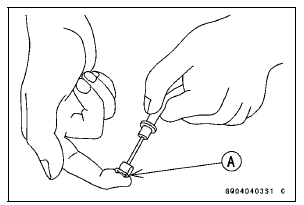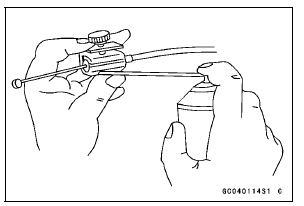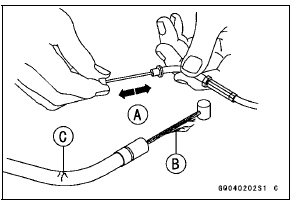

NOTE
Whenever the vehicle has been operated under wet or rainy conditions, or especially after using a high-pressure water spray, perform the general lubrication.
Pivots: Lubricate with Grease.
Brake Lever
Brake Pedal
Clutch Lever
Rear Master Cylinder Push Rod Joint Pin
Sidestand
Points: Lubricate with Grease
Clutch Inner Cable Upper and Lower Ends [A] Throttle Inner Cable Upper and Lower Ends

Cables: Lubricate with Rust Inhibitor.
Clutch Cable
Throttle Cables

The cable may be lubricated by using a commercially available pressure cable lubricator with an aerosol cable lubricant.
If cable movement is not free after lubricating, if the cable is frayed [B], or if the cable housing is kinked [C], replace the cable.

 Others
Others Bolts, Nuts and Fasteners Tightness Inspection
Bolts, Nuts and Fasteners Tightness InspectionWiring Diagram (Other than US, CA and CAL without KIBS Models)
ZX1000JC
ZX1000JD
...
Starter Clutch Installation
Replace the O-ring [A] with a new one and apply grease.
Apply molybdenum disulfide grease to the starter clutch
shaft [B].
Install:
Starter Clutch [C]
Spacer (Small Diameter) [D]
Spacer (Large Diameter) [E]
Starter Clutch Shaft
Starter Clutch Shaft Holder [F]
Turn the O-ring si ...
Camshaft Chain Tensioner Removal
NOTICE
This is a non-return type camshaft chain tensioner.
The push rod does not return to its original position
once it moves out to take up camshaft chain slack.
Observe all the rules listed below.
When removing the tensioner, do not take out the
mounting bolts only halfway. Retighteni ...